Wise Heart Nutrition Blog:
All Things Anti-Diet, Intuitive Eating, and ADHD
What to Do After a Binge: 5 Non-Diet Tips
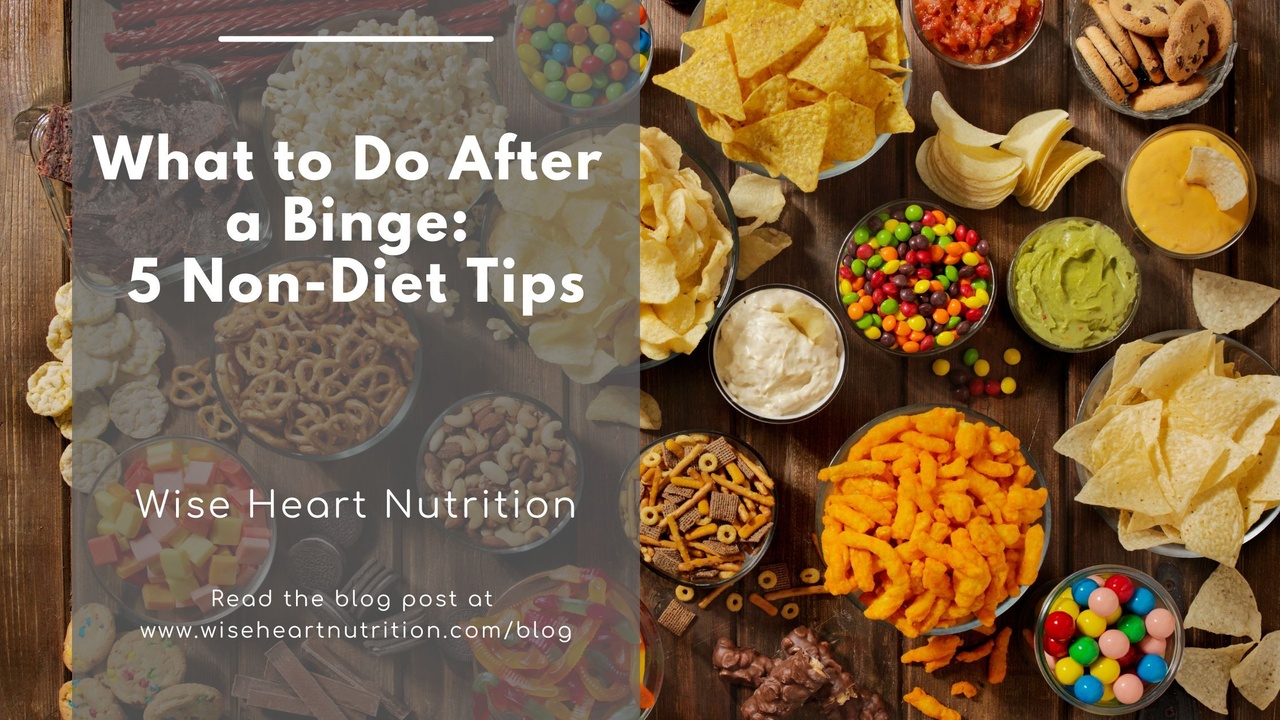
So, you've just experienced a binge eating episode... What do you do now?
Many individuals, (especially ADHDers and folx with a history of dieting) struggle with binge or compulsive eating, and more often than not, the binge eating is automatically seen as the "problem" to be fixed. This often results in deprivation and restriction to "make up for overeating", which then leads to more binge eating. In addition, beliefs about not having "enough willpower" or "discipline", as well as guilt and shame, often show up after or during a binge due to our society creating the myth that you should, or even can, have control over food. Binge eating, negative emotions, and restriction often spirals into a vicious cycle, which can feel impossible to break.
The cycle (see graphic below) has several stages: the binge, the sense of emotional relief or numbness, the thoughts and feelings that follow, the planning, the disruption to the plan, and then back to the binge. Diet culture has taught us ...
What Is Body Neutrality and How Can I Start Practicing It?

What If Body Positivity Isn't The Answer?
When you are first exploring what it would look like to not dislike your body, as media at large directs you to do, the body positivity movement can be met with rolled eyes and thoughts of “are you kidding me” and “that’s wayyy too hard”. And yeah, when starting from a place of hatred, disgust or dismissal of your body, it can seem an impossible task to ever reach a place of love, appreciation, and acceptance. Enter body neutrality.
While self love regarding our bodies is important, it’s not always attainable in our society where we are constantly flooded with messages about an “ideal body” that are rooted in white, colonial, and fatphobic systems. Here are some important reasons why body-positivity and body-love aren’t going to work for everyone:
- The mainstream body positivity movement isn’t actually inclusive of ALL bodies (The original creators of the movement - fat and POC women - have been noticeably overshadowed in the movement’...
Is Food Variety Important and Possible with a Neurodivergent Brain?

Are nutritional guidelines helpful for everyone?
Dietary variety (eating lots of different foods from all the different food groups) has long been considered a pillar of “good nutrition”. Blanket dietary recommendations like this are intended to support the greater population, but when these guidelines are solely focused on nutrients and physiological health, many groups of people get overlooked, left out, and placed in a disadvantaged position where health and wellness (when measured by whether or not a person is meeting a given recommendation) are essentially out of reach. And when these folx continue to chase after an impossible standard, other aspects of health (mental, emotional, relational, financial, etc.) suffer… and that isn’t really supportive of health at all.
When we talk about health, instead of trying to fit everyone into one box, we need to consider and understand what is REALISTIC, CONTEXTUAL, ACCESSIBLE, POSSIBLE, and SUSTAINABLE, and we need to recognize that...
The Religion of Health: A Personal Healing Story
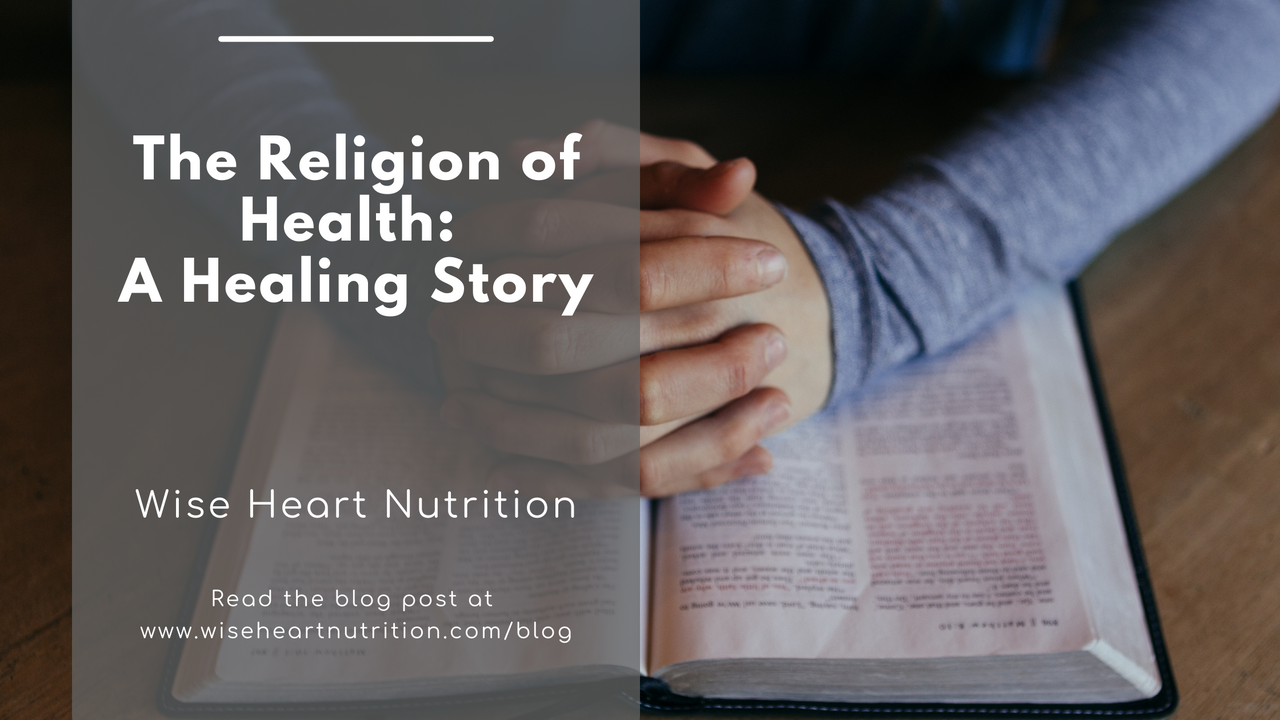
by Rebecca Hambright MS, RDN
I was raised in the Southern Baptist church in North Carolina. I was a good Christian girl, of course.
As a good Christian girl, I followed the rules:
- Did what my parents said
- Listened to the preacher
- Never caused a scene
- Was always polite
- Dressed modestly
- Didn’t cuss
- Was “in the world, not of the world”
- Told others about God so they could be saved
- Believed my body and human instincts were inherently sinful
There are many pages I could write about the ideologies I was programmed with in my religious upbringing, and how they shaped my view of myself. However, I will keep this piece focused on the parallels I have noticed between religious messaging and disordered eating motivations/behavior. I also want to acknowledge that for many, religion is a safe and wonderful framework through which to live their life. Unfortunately, many aspects of my specific situation resulted in religion being harmful to me.
One of the most famous C...
Do Womxn Go Through a "Second Puberty"?
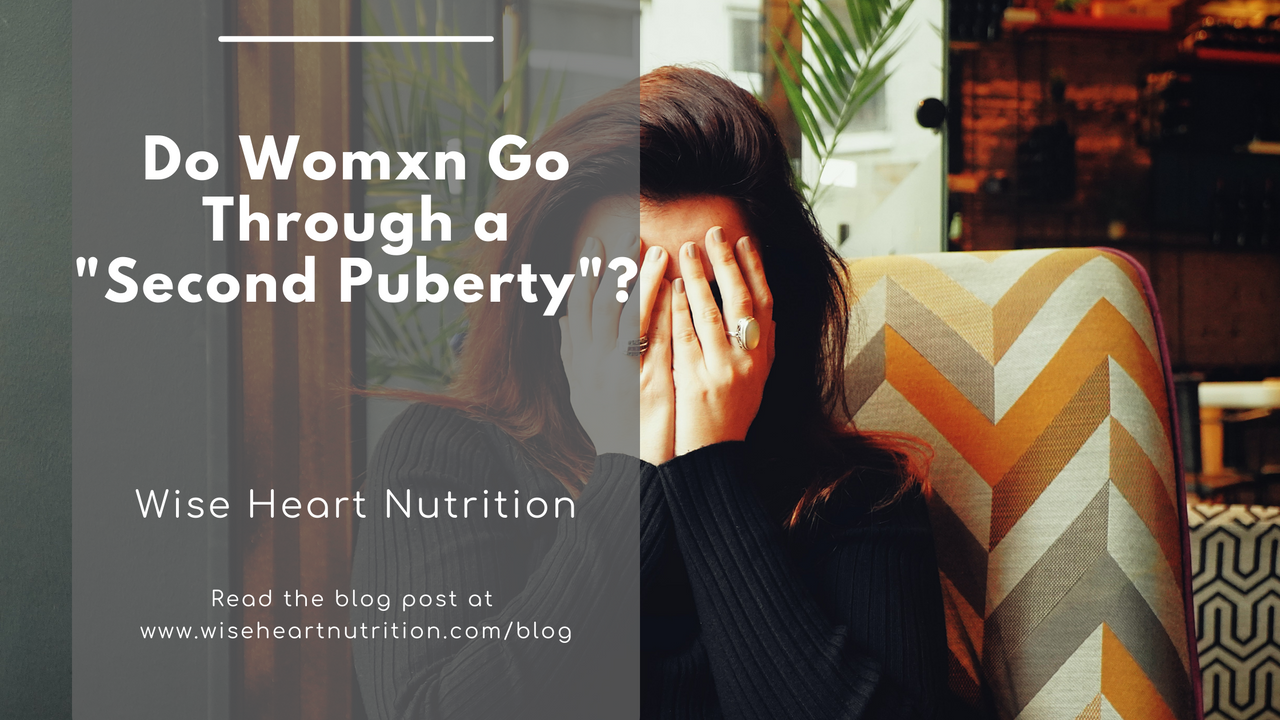
Remember puberty? That mostly awful phase of ~sexual maturation~ which for many of us felt like the worst time ever? Well, you might wanna sit down for this …
There’s a buzz going around that womxn (specifically folx who are AFAB) actually go through a “second puberty” in their early to mid twenties. Now, it’s not technically titled puberty 2.0, but it’s been casually called this because of the further physical changes your body typically undergoes during this time. Just when you thought you had gotten used to your body, you might find it changing again. And then probably again. And again. And then probably again. *News flash: our bodies are constantly changing over the course of our lives.* But for now, let’s focus on that mid-20’s time of life.
Some of the changes that you may see in your early to mid twenties can include:
-
psychological/emotional changes
-
bone mass peak
-
muscle mass peak
-
weight changes
-
stretch marks
-
acne
-
metabolic changes...
Is it Ok to Use Food to Cope with Emotion?
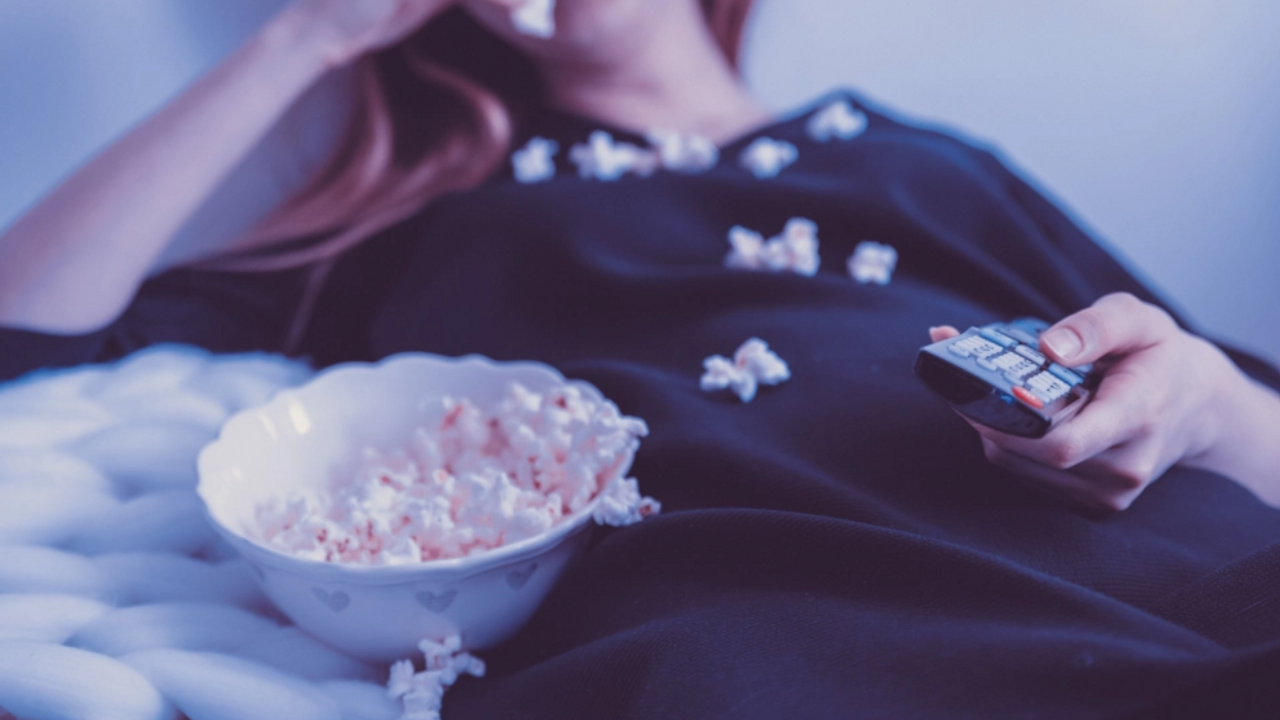
By Rebecca Hambright MS, RDN - Wise Heart Nutrition Dietitian
Who decided that “emotional eating” is bad? I don’t know exactly where this rumor started (other than the obvious master-villains... anti-fatness and diet-culture), but I want to slap my flip phone closed (ultimate diss - duh) and be done with this shitty game of telephone.
Instead, let’s flip this narrative around. Intuitive eating principles guide us to “cope with our emotions with kindness”, which ultimately means developing a tool box of coping skills and choosing one to compassionately meet our emotional needs. Sometimes food is that coping skill. And that’s ok!!!
Food is something that can be readily accessible, so it is common for it to be used as a coping mechanism from an early age. If you weren’t given the tools or support to develop other coping skills, it makes sense that you would turn to what you had available in your home, and for some (but not all) of us, that was food. In addition, food is alre...
Ok, But How Long Will I Only Want to Eat "Junk" Food?
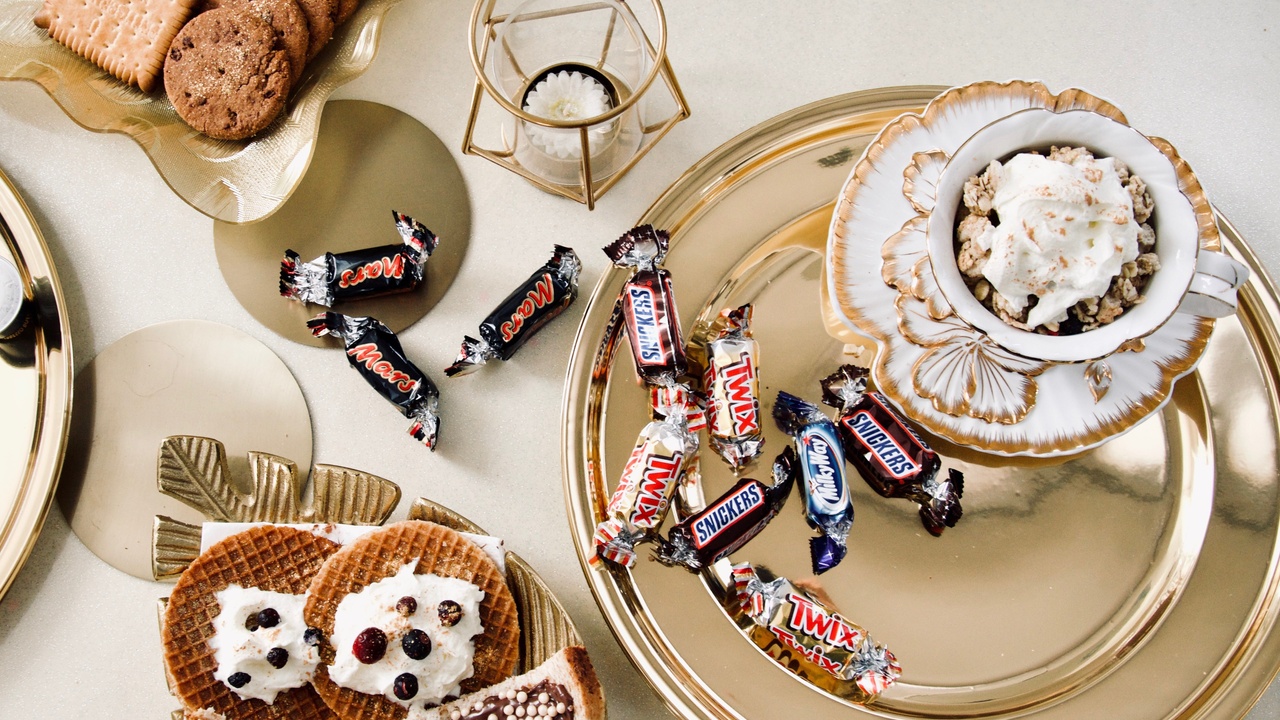
So if you’ve heard anything about intuitive eating, you’ve heard the classic slippery slope argument - “But that means you’ll only want to eat “junk food” forever”. Is that true, though?
When you first give yourself radical permission to eat all foods (with no labels), it is true that you may initially go through a phase of wanting to enjoy all the foods that you were previously restricting. We’ll call this the “fuck it phase”. This is because when you restrict or feel fear around a food, all it really does is build the power or allure this food holds over you. Like a kid who has been waiting all year for Halloween, you may go all in on the candy or “insert fun food here”. This experience is completely normal, and to be expected for us humans who undoubtedly will always want what we “can’t” have, whether real or self-imposed (hey thanks, diet culture :/)
Butttt, how long does this phase last?
I find that I get asked this question a lot. Like many people, you may want ...
Eating with ADHD®: Why Prioritization Matters?

Eating when you have ADHD can be overwhelming.
You planned to eat something, but then you got sucked into the ADHD black hole and totally forgot. Suddenly, it’s 5pm and you feel this primal, intense pull towards the kitchen cabinet, and find yourself in a frenzy, grabbing and eating cookies, chips, gummy bears, and peanut butter without actually enjoying any of it.
Or maybe you open the fridge and see the ingredients you bought to make dinner, but the thought of cooking brings on a flash of overwhelm, so you quickly order delivery for the 3rd time this week.
Or perhaps you have some meal options that sound doable, but in the moment, literally nothing sounds appetizing, so you just feel angry, irritated, and intensely emotional… and you end up curling up in a ball and avoiding all things food.
Yep. I’ve been there too. And for many years I thought that a) I lacked discipline and willpower, b) I had no motivation or impulse control, and c) I was a picky eater and there was not...
